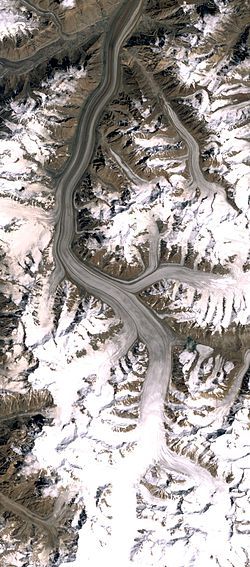Vanch-Yakh Glacier


The Fedchenko Glacier (Russian: Ледник Федченко) or the Vanch-Yakh Glacier (Tajik: Пиряхи Ванҷях) is a large glacier in the Yazgulem Range, Pamir Mountains, of north-central Gorno-Badakhshan province, Tajikistan. The glacier is long and narrow, currently[when?] extending for 77 kilometres (48 mi) and covering over 700 square kilometres (270 sq mi). It is the longest glacier in the world outside of the polar regions.[1] The maximum thickness of the glacier is 1,000 metres (3,300 ft), and the volume of the glacier and its dozens of tributaries is estimated at 144 cubic kilometres (35 cu mi)—about a third of the volume of Lake Erie.
Path and location
[edit]The glacier follows a generally northward path to the east of the 6,595-metre (21,637-foot) Garmo Peak. The glacier begins at an elevation of 6,200 metres (20,300 ft) and eventually melts and empties into the Balandkiik River near the border with Kyrgyzstan at an elevation of 2,909 metres (9,544 ft). Its waters eventually feed down the Muksu, Surkhob, Vakhsh, and Amu Darya rivers into the Aral Sea.
To the west is the Academy of Sciences Range, Mount Garmo, Ismoil Somoni Peak, Peak Korzhenevskaya, the headwaters of the Vanj River, and Yazgulyam River. To the south is Independence Peak and to the east Gorbunov Peak (6,025 meters). To the north is Altyn Mazar.
Discovery
[edit]The glacier was discovered in 1878 and was named after Alexei Pavlovich Fedchenko, a Russian explorer (but not the discoverer of the glacier). It was not fully explored until 1928 by a German-Soviet expedition under Willi Rickmer Rickmers. Between 1910 and 1913 the glacier expanded and moved forward by 800 to 1,000 metres (870 to 1,090 yd), blocking up the Balyandlik River the following year. It continued to recede between 1928 and 1960, stopping its inflows such as the Kosinenko, Ulugbeck, Alert and several others.[2]
In 2023, Tajikistan officially renamed the glacier as part of a derussification program.[3]
See also
[edit]Notes
[edit]- ^ In the Karakoram Mountains, the Siachen Glacier is 76 km long, the Biafo Glacier is 67 km long, and the Baltoro is 63 km long. The Bruggen or Pio XI Glacier in southern Chile is 66 km long. Kyrgyzstan's South Inylchek (Enylchek) Glacier is 60.5 km in length. Measurements are from recent imagery, generally with Russian 1:200,000 scale topographic mapping for reference as well as the 1990 Orographic Sketch Map: Karakoram: Sheets 1 and 2, Swiss Foundation for Alpine Research, Zurich.
- ^ "Field research of glaciers and glacial lakes located in Karatag, Vakhsh and Zeravshan river basin" (PDF). Meteo. Retrieved 13 May 2012.[permanent dead link]
- ^ "СМИ: крупнейший на Памире ледник Федченко переименован в "Ванджях"" (in Russian). 19 August 2023. Retrieved 2023-09-17.
References
[edit]- "Fedchenko Glacier". Encyclopædia Britannica online edition. Retrieved 8 December 2005.
- "The First National Communication of the Republic of Tajikistan under the United Nations Framework Convention on Climate Change. Republic of Tajikistan Ministry for Nature Protection. Dushanbe: 2002.
- "Tajikistan 2002: Vital Maps and Graphics on Climate Change" Archived 2006-05-01 at the Wayback Machine. Tajikistan Met Service. Retrieved 18 August 2005.
- "Tajikistan - Topography and Drainage". U.S. Department of the Army. Published by the Federal Research Division of the Library of Congress. Online version retrieved 8 December 2005.
External links
[edit]- Map of glaciation in the Pamir Mountains Archived 2006-05-15 at the Wayback Machine
- Google Maps satellite photo of Fedchenco Glacier (solid white line running approximately vertically in center of image)
- Current weather and 5-day forecast, from CNN
